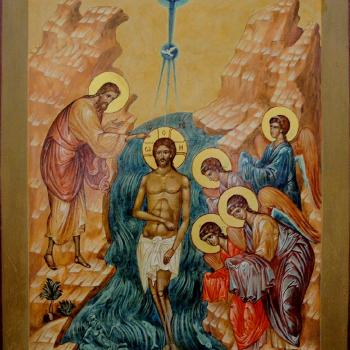
Baptism is important. Through it, we begin our Christian life, regenerated by grace. It is also how we are incorporated into Christ, becoming a part of the church, the body of Christ. While grace can be said to be bound to baptism so that a valid baptism will always bring us grace, God is not bound by the ritual. God can offer that grace by other means. However one receives it, one is born again, regenerated by grace, incorporated into Christ, and so, even if they have not undergone the ritual of baptism, they receive what is normally given by that ritual, baptismal grace. Through the reception of that grace, one can be said to be baptized, even if one did not receive ritual baptism, which is why baptism of desire and baptism of blood are also designated as baptism.
Scripture only gives a few elements as to what is expected for the execution of the baptismal ritual which means it does not indicate all that is to be done in the ritual. Thus, on the one hand, we are shown baptism must somehow connect to the Trinity. “Go therefore and make disciples of all nations, baptizing them in the name of the Father and of the Son and of the Holy Spirit” (Matt. 28:19 RSV). And yet, on the other hand, we are shown that some baptisms were done in the name of Christ alone: the apostles did not believe Jesus’ words were indicative of what had to be said in the rite of baptism. “And Peter said to them, ‘Repent, and be baptized every one of you in the name of Jesus Christ for the forgiveness of your sins; and you shall receive the gift of the Holy Spirit’”(Acts 2:38 RSV). Historically, both forms have been used and seen as valid, even as other forms, other words have also been used, as Nicholas of Cusa observed: “It is manifest in the praxis of the Church, even in the forms of its sacraments. The apostles baptized in the name of Jesus; at another time the Church did so in the name of the Trinity. Today the Greek church baptizes otherwise than the Latin church does, and always with effect.” [1] There is a wide range of possibilities as to how ritual baptism could be executed, and in each form, baptismal grace is given out:
Hence those who once were baptized “in the name of Christ,” – even infants – whose faith was sound on all articles, and also [those baptized in the name of] the Trinity, are no less reborn in Christ than those today [who are baptized] “in the name of the Father and of the Son and of the Holy Spirit.”[2]
The fact that there have been, and continue to be, a variety of ways in which baptism can be performed has led Christians to consider what is and is not necessary for the rite to be valid. St. Thomas Aquinas tells us the basics include: proper form, proper matter (water), and a minister to the baptism. While there can be reasons why other things should be included in the rite, they are not essential:
I answer that, In the sacrament of Baptism something is done which is essential to the sacrament, and something which belongs to a certain solemnity of the sacrament. Essential indeed, to the sacrament are both the form which designates the principal cause of the sacrament; and the minister who is the instrumental cause; and the use of the matter, namely, washing with water, which designates the principal sacramental effect. But all the other things which the Church observes in the baptismal rite, belong rather to a certain solemnity of the sacrament. [3]
What constitutes the proper form is what is most often questioned. It should be clear, because we can find a variety of examples over time where the baptismal words differ from each other, it is not the words themselves but the intention behind the words which is necessary. This is why baptism can be done in the name of Christ, or in the name of the Trinity, or in the name of the Father, Son and Holy Spirit. What is key is that baptism should be done with a belief in and adherence to the Trinity, as St. Ambrose taught:
And so they were baptized in the name of Jesus Christ, and baptism was not repeated among these, but was received for the first time; for there is one baptism. Moreover, where there is not the full sacrament of baptism, there is not considered to be a beginning or any kind of baptism. But baptism is full, if you confess the Father and the Son and the Holy Spirit. If you deny one, you will ruin the whole. And just as when you comprehend one in words, either Father or Son or Holy Spirit, yet do not deny in faith either the Father or the Son or the Holy Spirit, the sacrament of faith is full, so also, although you mention the Father and the Son and the Holy Spirit, and reduce the power of the Father or of the Son or of the Holy Spirit, the entire mystery is void. [4]
Hugh of St. Victor and Peter Lombard used this reasoning to point out that it would be possible to baptize in the name of the Father or in the Holy Spirit without mentioning the other Trinitarian persons. For, once you believe in the Trinity, a mention of one of the persons implies the rest of them. For example, Ambrose explained that in the case of those who baptized in the name of Christ alone, the validity of that baptism was ascertained because mention of Christ implies the Father and the Spirit: “If you say Christ, you have designated also God the Father by whom the Son was anointed, and Him Himself who was anointed, the Son, and the Holy Spirit with whom He was anointed.” [5] It is faith in the Trinity, and not the words themselves, which is essential. “You see, then, how in the faith of the Trinity, when the Father alone or the Son or the Holy Spirit is mentioned, the sacrament of baptism is complete and how without the faith of the Trinity, even when the three have been named together, it is imperfect.” [6] Thus, naming one person of the Trinity, understanding the relationship of that one person with the rest of the Trinity, would make the baptism Trinitarian, and so would suffice:
From these statements, you have plainly understood that true baptism is conferred in Christ’s name. It also appears to be indicated that a true baptism can be conferred in the name of the Father alone, or of the Holy Spirit alone, so long as the one who baptizes has faith of the Trinity, which Trinity is understood in each of these names. But if someone who believes perversely, and who intends to foment error, invokes only one of the three, he has not fulfilled the mystery. [7]
This does not mean that the church errs in making the typical baptismal formula to be one which is done in the name of the Father, Son and Holy Spirit: though such words are not essential, they are important as they help ensure a Trinitarian faith is involved in the baptism instead of merely assuming it:
And so someone who baptizes in Christ’s name baptizes in the name of the Trinity, when this is understood there. But it is safer to name the three persons there, so as to say: In the name of the Father, and of the Son, and of the Holy Spirit. [8]
Words, therefore, are important, but we must not treat them as magic, as if we must say the right words without variation for a particular baptism to be effective. Baptismal validity concerns the faith of those being baptized. God is not looking for reasons to deny grace to those who come to be baptized with a proper intention. God does not demand one formula for baptism. This does not mean the words used are meaningless. The church has established and promoted various forms to be used as a way to represent and symbolize what is going on with the sacrament. This is why the church can expect and require ministers to use particular words to safeguard our understanding of baptism, not because the words are essential, but because the church tries to determine the best form, the best discipline, by which baptism is to be practiced. It is important for the minister of the sacrament to follow what is expected of them and not to change things when baptizing someone. This makes sure there is no cause for confusion or scandal, but if someone did make a mistake, if they accidentally changed some words or got them wrong, the sacrament itself is not invalidated, as Peter Lombard pointed out with a specific example:
WHETHER THERE IS A BAPTISM, IF THE AFOREMENTIONED WORDS ARE UTTERED IN A CORRUPT FORM. It is also usual to ask whether there is a baptism, if the aforementioned words are uttered in a corrupt form. – POPE ZACHARIAS. Concerning this, Zacharias writes to Boniface: “Your messengers reported to me that there was a priest in that province who was thoroughly ignorant of the Latin tongue and that, while baptizing, in his ignorance of Latin, he stammered: I baptize you in the name of the Fatherland, and the Daughter, and of the Holy She-spirit. Because of this, you wondered whether to re-baptize. But if the one who baptized did not introduce any error or heresy, but stammered as he did only because of his ignorance of Roman speech, we cannot consent to a new baptism.”[9]
Baptism, therefore, can be done in a variety of ways. The intention is what is most important. This is why baptism can be done with the minister of the baptism saying, “I baptize you in the name of the Father, and of the Son, and of the Holy Spirit,” as it is done in the Latin tradition, or with the minister simply saying, “The servant of God (Name) is baptized in the name of the Father and of the Son, and of the Holy Spirit.” The words “I baptize” are not essential to the rite of baptism. Using them or not using them does not change the validity of the baptism itself:
The Greeks, however, do not attribute the act of baptizing to the minister, in order to avoid the error of those who in the past ascribed the baptismal power to the baptizers, saying (1 Corinthians 1:12): “I am of Paul . . . and I of Cephas.” Wherefore they use the form: “May the servant of Christ, N . . ., be baptized, in the name of the Father,” etc. And since the action performed by the minister is expressed with the invocation of the Trinity, the sacrament is validly conferred. As to the addition of “Ego” in our form, it is not essential; but it is added in order to lay greater stress on the intention. [10]
What is or is not essential differs from what is normally expected to be said and done in the rite of baptism. The church has developed the rites which it expects its ministers to use. Unless there are legitimate reasons why they cannot be used as they are written down, the minister who changes the words on their own accord (but not the intention) will provide a valid but illicit baptism. We should not confuse what is necessary for the rite to be licit for what is essential for the sacrament to be valid. If we do so, we misunderstand baptism and begin to treat the ritual as if it is an act of magic which requires everything to be done in a particular way for it to be effective. What is not essential, but important, to the rite, is determined by the church, and is a part of the discipline surrounding the act of baptism itself. The church establishes the rite in the way it thinks will best express or symbolize the sacramental grace being offered. Sacraments are not bound to particular words, which is why the words have changed throughout the centuries without diminishing the sacramental grace itself.[11] Baptism can, and has been done, in a variety of ways, and there are many other ways which baptism could be done in the future though it is unlikely they should be normally employed. What is essential is the use of water, a minister to proclaim the baptism being done, and faith in the Trinity. [12]
Essentially, baptism is an act of faith; through that act, one is incorporated into the body of Christ. The grace which we receive comes to us by Christ and the Trinity, and is not something which we create ourselves, which is why baptism must not be seen as some sort of magic act in which if we use the right formula, we generate grace and are saved. This is why we must not look merely at the words used, but the intention which lies behind the words, to see if a particular baptism is proper or not; if we get too caught up in the words, we begin to lose sight of how God works, for God is love and not a tyrant bound by legalism.
[1] Nicholas of Cusa, “Letter To The Bohemians on Church Unity” in Nichola of Cusa: Writing on Church and Reform. Trans. Thomas M. Izbicki (Cambridge: Harvard University Press, 2008), 411.
[2] Nicholas of Cusa, “To The Bohemians: On the Use of Communion” in Nichola of Cusa: Writing on Church and Reform. Trans. Thomas M. Izbicki (Cambridge: Harvard University Press, 2008), 73.
[3] St. Thomas Aquinas, Summa Theologica. trans. Fathers of the English Dominican Province (New York: Benziger Brothers, 1948), III-66.10.
[4] St. Ambrose, On the Holy Spirit in Theological and Dogmatic Works. Trans. Roy J. Deferrari (Washington, DC: CUA Press, 1963), 49-50.
[5] St. Ambrose, On the Holy Spirit, 50.
[6] Hugh of St Victor, On the Sacraments of the Christian Faith. trans. Roy J. Deferrari (Cambridge: The Medieaval Academy of America, 1951), 288.
[7] Peter Lombard, The Sentences. Book 4: On The Doctrine Of Signs. Trans. Giulio Silano (Toronto: Pontifical Institute of Medieval Studies, 2010), 36 [IV-iii.4].
[8] Peter Lombard, The Sentences. Book 4: On The Doctrine Of Signs, 36 [IV-iii.4].
[9] Peter Lombard, The Sentences. Book 4: On The Doctrine Of Signs, 35 [IV-vi.4].
[10] St. Thomas Aquinas, Summa Theologica, III-66.5.
[11] We can see how this applies in the eucharist, where the words of institution are not expressly and literally invoked by the Anaphora of Addai and Mari and yet the eucharist is valid because of the intention and the epiclesis involved.
[12] There are a variety of ways in which the water can be used. For example, one could be sprinkled with water or immersed in it. One can likewise sprinkled or immersed once or three times. The most expressive, and so possibly, the best form of baptism would be triple-immersion, but a one-time sprinkling or immersion in water would fulfill all that is necessary.
Stay in touch! Like A Little Bit of Nothing on Facebook.
If you liked what you read, please consider sharing it with your friends and family!













